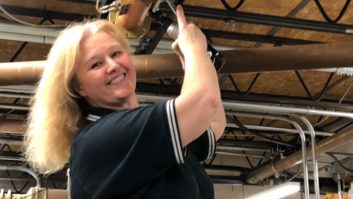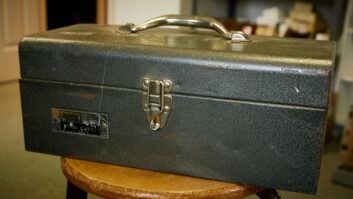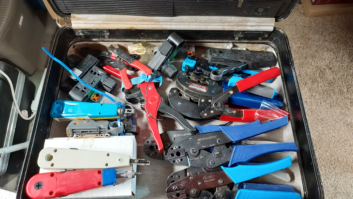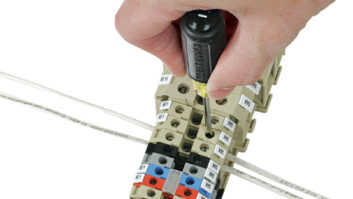This is one in a series of occasional articles about broadcasting schools and educational programs.
Specs Howard was a mild-mannered yet slightly wacky DJ who with his partner, Harry Martin, graced the airwaves of Cleveland and Detroit in the 1960s.
Howard now is chairman of the board of a broadcast school that bears his name. His son, Jon Liebman, is CEO. Specs Howard School of Broadcast Arts near Detroit has been in existence for 33 years and has graduated approximately 12,000 radio and television students. It promotes itself as “the only school in Michigan exclusively dedicated to providing students with the practical training necessary for breaking into the business of radio and television.”
Dick Kernen, vice president of industry relations for the school and a recent inductee into the Michigan Broadcasting Hall of Fame, teaches classes between other assignments.
“Typically we will graduate about 450 people each year,” Kernen said. “This includes radio and TV classes.”
From the early days when Specs Howard himself taught several students in a small classroom, the school decided to be a “hands on” rather than a mail-order operation. Management also decided to maintain one location near Detroit rather than franchise the name to other cities.
“When you begin to franchise, you give up control,” Kernen said. “Unless you’re McDonalds, it’s tough to keep an eye on standards.”
Keeping pace
Since the school was founded, turntables and razor blades have given way to MiniDisc players in 20 modern radio studios. Part of a current $1.5 million upgrade will convert them to touch screen. There are several ENCO Systems computer systems in place; and the school has purchased ten Avid non-linear edit suites for TV courses.
There are about 16 full-time faculty plus four executives with separate staffs for the TV and radio training programs.
The school offers a full-time program; because about 70 percent of the students have jobs, three shifts are offered. Day students attend from 8:30 to 1 p.m.; afternoon students take classes between 1:15 and 5:45 and night courses are held between 6 and 10:30 p.m.
“The only part-time people we have are lab assistants,” said Kernen. “These are current students, who are responsible and mature.”
Specs Howard School of Broadcast Arts eschews the use of “celebrity” teachers, even though big names would draw favorable attention.
“The problem with that idea is as long as they are part-time here, we only would get a part-time priority from them,” Kernen said. “When our students are paying about $10,000 for an eight — to 12 — month course of study, you can’t just stick up a sign saying the celebrity isn’t going to be there on a given day.”
The school can help arrange housing for visiting enrollees and has agreements with nearby colleges and universities with available dorm space. Another alternative offered is helping the students find a low-cost apartment.
“And speaking of students, with the advent of the Internet, they now come to us from as far away as Norway, Austria, Belize and Canada,” he said.
Placement looks rosy
Kernen said about 2,000 people working in southeast Michigan alone have graduated from the school, and grads have ended up in a variety of broadcast careers around the world. Alumni are working at XM Satellite, the ABC Radio Networks, Westwood One and in almost every state, in on — air and off — air capacities.
Most people have the impression that this is a “DJ school,” but according to Kernen, it’s much more.
“We are very big into promotion and marketing training as career tracks,” he said. “We don’t teach sales, because not many young people want to go into this area. Most think selling is something you do until you get a good job.”
Kernen said great sales people are self — motivated and enjoy going to work as much as on — air personalities and newscasters.
“So it’s intriguing to look back over the last 32 years and see how many of our people are now in sales,” he said. “We have five sales managers here in Detroit alone, but they had to realize that this is what they wanted on their own.”
The school also doesn’t teach engineering, but many grads end up in that area as well.
Specs Howard has a placement rate of 84.2 percent, excluding students who continue their education, join the military, leave no forwarding address for follow-up or just enter other businesses.
The school has agreements with several two — and four — year higher learning institutions that accept credits for its classes.
“In fact,” said Kernen, “we have an arrangement with Rochester College which allows the students to finish their college degree without leaving the building here.”
One of the earliest success stories is Karen Dalessandro, one of the morning hosts at WMIL(FM) in Milwaukee. She recently was voted personality of the year by the Country Music Association and has been at her current job since 1998.
“I went into Specs Howard right out of high school in 1980 and was actually placed before I completely finished the course,” she said. “They sent me to a country station in nearby Ypsilanti, Michigan, called WSDS(AM), but I was more of a rock and roller, so I soon got a job in Lansing.”
Dalessandro said Dick Kernen was teaching classes even when she was in the school.
“At that time there were very few females in broadcasting, but gender was never an issue at that place. They just wanted to give us everything they could,” she said. “Dick (Kernen) is a very special person to me. He’s been there for me all these years and still gives me advice.”
Kevin Scollin serves as placement director at Specs Howard School of Broadcast Arts, but he remains one of the most in-demand freelance announcers in Detroit.
“I do a lot of furniture commercials and national Chevy spots,” he said. “I’ve been telling people for years about this school, so it’s funny that I’ve ended up working here now.”
Dick Kernen, along with Mike Kronforst of Brown Institute in Minneapolis, recently received the Conclave Learning Conference Rockwell Award. This honor is given to those who have contributed to the radio and record industries through inspiration, mentoring and achievement.












